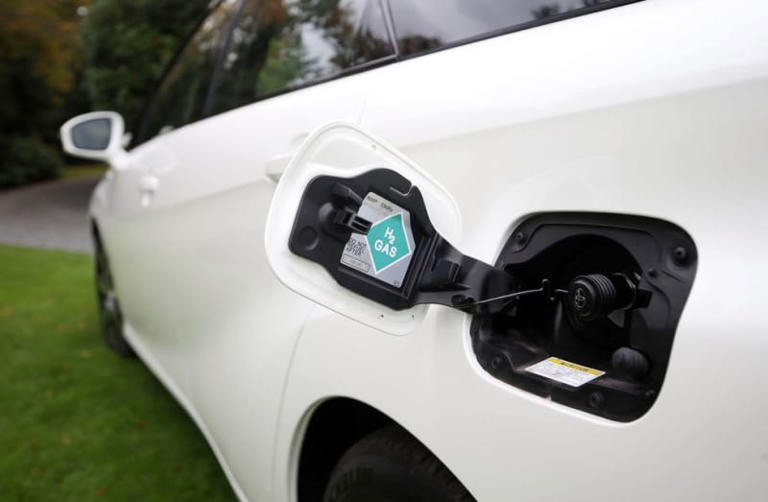Embracing the Future: Hydrogen-Powered Vehicles Revolutionizing Transportation
Discover the promising future of hydrogen-powered vehicles and how they’re reshaping transportation. From reducing emissions to promoting sustainability, explore the latest advancements and government initiatives driving this revolutionary shift.

© GB News
Hydrogen-powered vehicles: Pioneering a Green Revolution in Transportation
Hydrogen-powered vehicles are heralding a new era in transportation, offering a clean and sustainable alternative to traditional fossil fuel-powered cars. With advancements in technology and growing support from governments and industries worldwide, hydrogen-powered vehicles are poised to revolutionize the way we travel while addressing pressing environmental challenges.
Driving Toward Sustainability: The Rise of Hydrogen-Powered Vehicles
In recent years, there has been a concerted effort to accelerate the adoption of hydrogen-powered vehicles as part of broader sustainability initiatives. These vehicles utilize fuel cells to generate electricity, with hydrogen as the primary fuel source. Unlike conventional vehicles that emit harmful pollutants, hydrogen-powered vehicles produce only water vapor and heat as byproducts, making them a cleaner and greener option for transportation.
Government Initiatives and Support
Governments around the world are recognizing the potential of hydrogen-powered vehicles in mitigating climate change and reducing air pollution. In the UK, for example, a new consultation has been launched to explore the feasibility of using hydrogen-powered vehicles in various sectors, including farming and construction. This initiative aims to decarbonize key industries while promoting the adoption of cleaner transportation alternatives.
Technological Advancements
One of the driving forces behind the rise of hydrogen-powered vehicles is ongoing technological innovation. Companies like Intelligent Energy are developing more efficient and cost-effective fuel cell systems, making hydrogen-powered vehicles increasingly viable for mass adoption. With advancements in fuel cell technology, hydrogen-powered vehicles are becoming more powerful, reliable, and affordable, paving the way for widespread adoption in the near future.
© GB News
The Promise of Hydrogen Fuel Cell Systems
Hydrogen fuel cell systems offer several advantages over traditional combustion engines and battery-powered electric vehicles (EVs). They provide longer driving ranges and shorter refueling times compared to EVs, addressing common concerns about range anxiety and charging infrastructure. Additionally, hydrogen fuel cells can be used in a variety of vehicles, including cars, vans, trucks, and even heavy-duty equipment like tractors and forklifts, making them versatile options for different industries.
Cost Competitiveness and Affordability
While hydrogen-powered vehicles have historically been more expensive than their gasoline counterparts, ongoing advancements in technology are driving down costs. Companies like Intelligent Energy are working to reduce the cost of fuel cell systems, making hydrogen-powered vehicles more accessible to consumers and businesses. By the end of the decade, hydrogen fuel cell systems are projected to be cost-competitive with EVs and traditional internal combustion engine vehicles, further incentivizing their adoption.
Environmental Benefits and Emissions Reduction
One of the most significant advantages of hydrogen-powered vehicles is their potential to reduce greenhouse gas emissions and air pollution. By using hydrogen as a fuel source, these vehicles produce zero tailpipe emissions, helping to improve air quality and combat climate change. As governments worldwide implement stricter emissions regulations and initiatives to promote cleaner transportation, hydrogen-powered vehicles are emerging as a key solution for achieving sustainability goals.
A Greener Future: Hydrogen-Powered Vehicles in Action
The implementation of hydrogen-powered vehicles in various sectors, including farming and construction, is already underway. With the ability to power tractors, diggers, forklifts, and other heavy equipment, hydrogen fuel cells offer a cleaner alternative to diesel engines, reducing emissions and environmental impact. By embracing hydrogen-powered vehicles, industries can decarbonize operations, improve efficiency, and contribute to a more sustainable future.
Public Engagement and Feedback
As governments and industries continue to explore the potential of hydrogen-powered vehicles, public engagement and feedback play a crucial role in shaping future policies and initiatives. The ongoing consultation in the UK invites input from drivers, businesses, and other stakeholders, ensuring that decisions align with the needs and preferences of the community. By actively involving the public in the transition to cleaner transportation solutions, governments can foster greater support and participation in sustainability efforts.
Looking Ahead: The Future of Hydrogen-Powered Vehicles
The future of transportation is undoubtedly being shaped by the rise of hydrogen-powered vehicles. With ongoing technological advancements, government support, and growing public awareness, hydrogen-powered vehicles are poised to become more affordable and commonplace on roads worldwide. As we strive to build a more sustainable and resilient future, hydrogen-powered vehicles offer a promising solution for reducing emissions, improving air quality, and preserving the planet for future generations.
Conclusion
Hydrogen-powered vehicles represent a significant breakthrough in sustainable transportation, offering a cleaner and greener alternative to conventional vehicles. With support from governments, industries, and the public, these vehicles are driving toward a future where emissions are minimized, air quality is improved, and sustainability is prioritized. By embracing hydrogen-powered vehicles, we can pave the way for a cleaner, healthier planet for generations to come.
ALSO READ:
https://cypranetnewsuk.com/electric-vehicle-range-627-miles-of-unstoppable-efficiency/